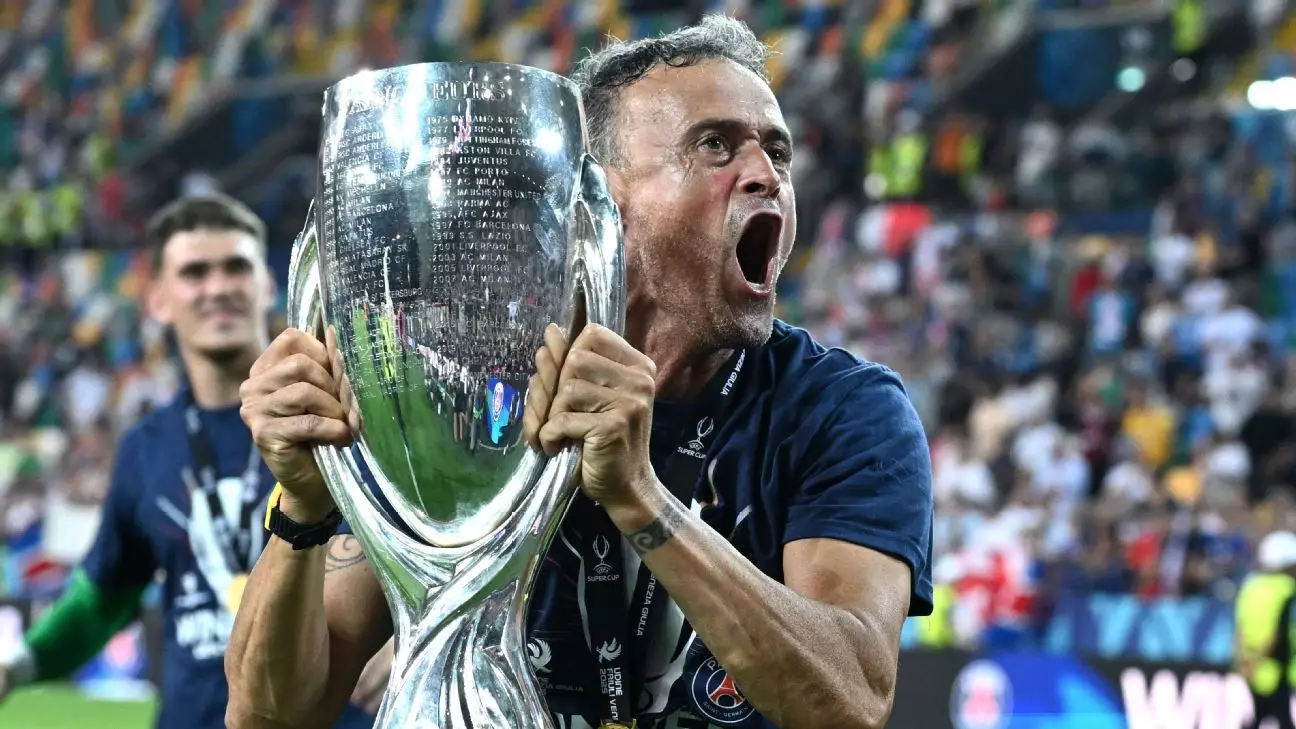In the world of football, few moments encapsulate the sport’s essence as profoundly as PSG’s miraculous comeback in the UEFA Super Cup. The match, characterized by dramatic shifts and sheer unpredictability, serves as a testament to the enduring spirit of perseverance that elevates the beautiful game beyond mere skill. Luis Enrique’s team was faced with an uphill battle from the start, trailing 2-0 with minutes ticking down. Yet, their resilience—not just physical but also mental—transformed what seemed like an inevitable defeat into an astonishing victory. It highlights a crucial lesson: victory often belongs to those who refuse to surrender, regardless of the scoreline or circumstance.
The closing moments of this encounter lay bare the raw emotion that makes football a sport of passion and hope. PSG’s ability to rally from the depths of despair underscores that, sometimes, perseverance can rewrite destiny. The last-minute heroics by Lee Kang-in and Gonçalo Ramos exemplify how belief, coupled with relentless effort, can turn the tide. This match wasn’t just about trophies or statistics; it was about the fiery spirit of competition and the belief that no outcome is set in stone until the final whistle blows.
Questioning Strategy and Preparation in Modern Football
Luis Enrique’s candid remarks about PSG’s fitness level and preparation shamelessly expose a harsh reality of contemporary football: timing and readiness can make or break a season. His acknowledgment that his team had only been training for six days post-Club World Cup final underscores an uncomfortable truth—success often requires cohesion and sharpness that come from intensive preparation. The stark contrast in physical condition between PSG and Tottenham was evident, revealing the importance of proper training, rhythm, and team synergy.
Enrique’s honesty also invites reflection on managerial tactics: Does the obsession with short-term gains—such as jumping straight into high-stakes matches—undermine long-term stability? PSG’s late rally was not solely about talent but also luck, as Enrique admitted, suggesting that in football, preparation and strategic planning are sometimes overlooked in favor of immediate results. The match was an unintentional yet powerful reminder of the importance of holistic team development and consistent training regimes.
Emergence of New Talent and Leadership Shifts
The debut of Lucas Chevalier’s goalkeeper role marked a defining moment for PSG’s evolving squad. His participation drew significant attention, not only because he took over from renowned Gianluigi Donnarumma but also for the profound pressure faced by new players stepping into big shoes. His performance, marred by mistakes yet highlighted by a crucial penalty save, encapsulates the unpredictable journey of integration and growth for emerging talents in top-tier clubs.
Chevalier’s debut symbolized more than individual effort; it reflected the shifting dynamics within PSG’s squad. As Donnarumma’s departure loomed—possibly driven by the desire to seek challenges elsewhere—it raised questions about how clubs manage transitions at crucial positions. It’s an affirmation that the future of football is not always about established stars but often about nurturing and trusting young players. These moments of crisis and opportunity foster resilience, forge character, and shape the leadership that will define PSG’s trajectory in the coming seasons.
The Psychology of Commitment and Team Unity
Vitinha’s emphasis on collective effort—highlighting how teamwork sustained PSG even in defeat—resonates deeply with the core philosophy of soccer. In a game where individual brilliance can steal the spotlight, the true magic lies in unity and mutual support. The psychological resilience built through collective belief proved decisive, especially when individuals faltered in the shootout. That PSG’s players kept faith and pushed through adversity demonstrates they understand the power of cohesion—a trait that can often be underestimated in the glamour of star-studded lineups.
Moreover, the reactions and comments from players and management reveal a depth of character that transcends mere athletic ability. Luis Enrique’s acknowledgment of Donnarumma’s personality and Vitinha’s leadership underscores an understanding that true winners are those who nurture mental toughness alongside technical prowess. In the relentless pursuit of excellence, psychological durability becomes an often-unsung hero, bridging the gap between fleeting success and enduring greatness.
The Complex Reality of Modern Football Management
What emerges from this match is an intricate narrative about leadership, strategy, and the personal qualities required to succeed at football’s highest levels. Luis Enrique’s comments about the unfairness of results, the physical unpreparedness of his team, and the virtue of patience and belief reveal a coach assessing not just the game but also the human elements that underpin success.
The departure or potential departure of Donnarumma is more than a contractual matter; it signals a broader understanding that stability in key positions demands leadership, confidence, and resilience. This scenario epitomizes the high-pressure environment modern coaches navigate—balancing immediate results with long-term development, all while managing egos, expectations, and mental strength. Enrique’s positive reflections on his team’s courage and fighting spirit demonstrate that leadership in football is as much about instilling mental fortitude as tactical acumen.
The match serves as a microcosm of football’s layered realities: strategic planning, individual talent, psychological resilience, and unyielding team unity. And while luck played a role in PSG’s victory, it’s their unbreakable spirit and will to fight that ultimately define their character in the game’s grand theater.

